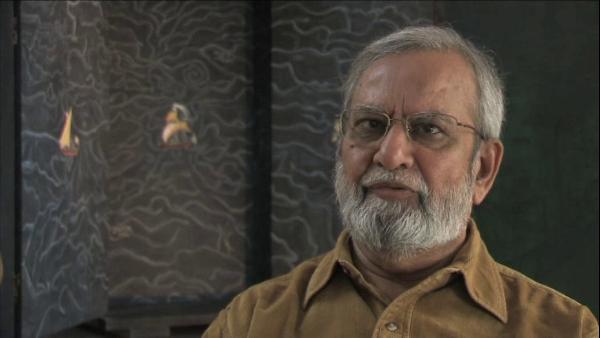NEXT STORY

City for Sale
RELATED STORIES

NEXT STORY

City for Sale
RELATED STORIES


|
Views | Duration | |
|---|---|---|---|
| 41. About my paintings (Part 1) | 51 | 08:33 | |
| 42. About my paintings (Part 2) | 37 | 07:23 | |
| 43. Creating panels for The Times of India office | 24 | 03:15 | |
| 44. Speaking in many tongues | 52 | 06:35 | |
| 45. Maps and palimpsests in my work | 63 | 06:55 | |
| 46. Inter-faith marriages and difficulties being a Muslim | 70 | 05:16 | |
| 47. City for Sale | 72 | 03:16 | |
| 48. Teaching and painting | 27 | 05:22 | |
| 49. Salman Rushdie and magic realism | 51 | 03:30 | |
| 50. Exhibition in Paris and stories in my work | 36 | 06:19 |


Well, there are many who have done similar things in the past, you know, so sort of inter-community or inter-religious marriages are not something uncommon. So it was as simple as that, that two human beings sort of, you know, come together and want to live together then they get married, so we had a civil marriage. It’s also interesting that her family had no objection, even my family – it’s very interesting. I mean, I took her home, they were very, very hospitable and they immediately accepted her. And Nilima, I told her that one thing you could do is that if you know a little Gujarati, please speak. Because one of the things that they asked was whether she speaks Gujarati or not – she was not sure why, even I was not sure why – but we realised later that it was because they wanted her to speak to children. So when she put on a Gujarati sari, when she spoke to women and she spoke to children, never ever a question was asked whether she, whether there is any question of her being what she was, until today. My son has married a new girl and we went there only a few months ago, and the same family, now the younger people, my brother’s son, Omor, but his children, my nephews are there, my nieces are there, they mixed with the whole family, so there is that kind of an acceptance. So there is no, neither hard feelings nor there is something which they cannot accept, so there is space. What I would say is that despite the fact that they might find it difficult if I were to live there, you know, in that region, because you see their parents will have to, sort of, work it out. But as far as I’m concerned and my family is concerned, my family and Surendranagar has had no problem.
Do you feel you have ever suffered as a Muslim?
I would not say that I have personally suffered in that sense, except that, you know, it is quite well known now that it is very difficult with a Muslim name, you know to, because you are marked. And hence, like for instance if you want to, let us say, want to rent a place, if you want accommodation, if you want to buy property, if you want to do certain things, you are being discriminated, it’s very clear. Even when I was there in the university I, at one point of time, had to go out of university because there was no accommodation and then outside it was next to impossible to find a place in a decent locality. So that issue is very, very... and it got further aggravated after 2002.
Will you... 2002 being?
2002 was, developed there, you know, most horrifying instance in which, you know, it was after this terrible, kind of, event of burning of a coach, a train at a place called Godhra. So this was... there were these what they call karsevaks, those who had gone to Ayodhya, you know, Ram Temple, and they were returning and this coach was, caught fire and a number of people burnt there. Well, there was soon after, a kind of a conflagration, you know, all over the state and it lasted several days where Muslims were targeted wherever they were, either in the city or in the villages and it was sort of a carnage. The main issue here is that the state seem to take no notice of this kind of carnage that was taking place in front of the eyes of the leaders, so there was a kind of complicity so Muslims became, sort of, very unsafe, and since then there has been a greater discrimination. So it is an issue, you know, which I think all secular and, perhaps, those who are liberal-minded have talked about and it has been sort of even written about here at great length.
Gulammohammed Sheikh is an Indian painter, writer and art critic who has been a major figure in the Indian art world for half a century. His artistic career is closely associated with the renowned MS University of Baroda in Gujarat where after gaining his Master's degree, Sheikh went on to teach in the Faculty of Fine Arts, and where he was appointed Professor of Painting in 1982.
Title: Inter-faith marriages and difficulties being a Muslim
Listeners: Timothy Hyman
Timothy Hyman is a graduate of Slade School of Fine Art, London, in which he has also taught. In 1980 and 1982, he was Visiting Professor in Baroda, India. Timothy Hyman has curated many significant art exhibitions and has published articles and monographs on both European and Indian artists.
Duration: 5 minutes, 16 seconds
Date story recorded: December 2008
Date story went live: 18 November 2010